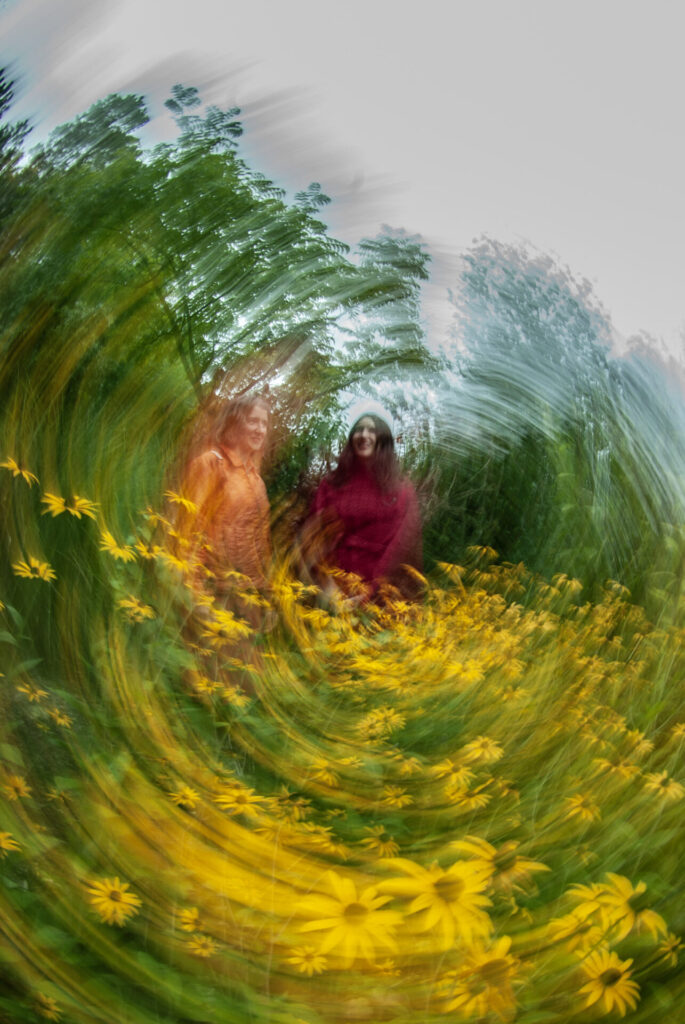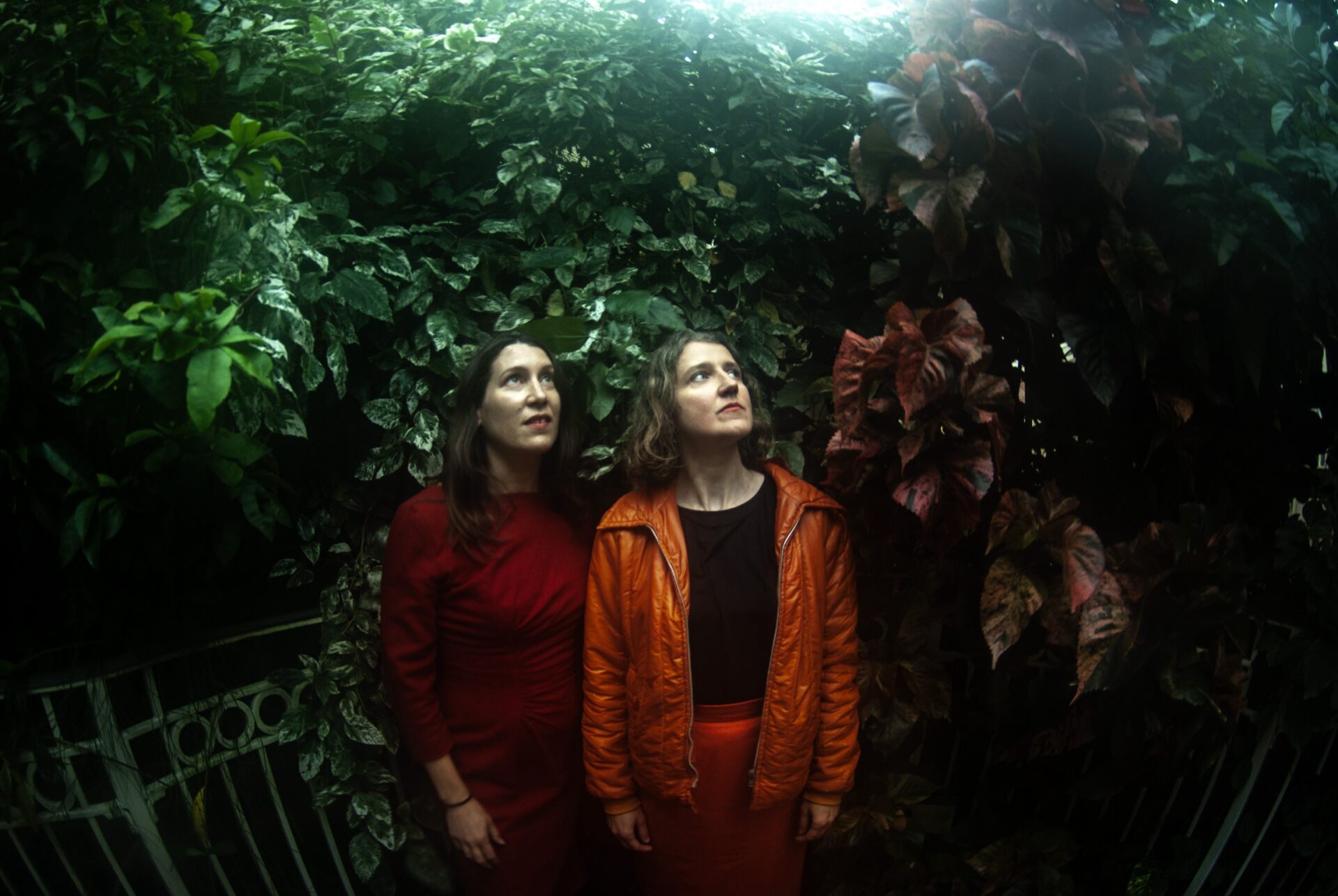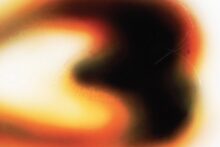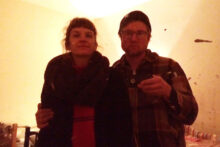It starts with a loop of three strikes on a floor tom – a drumbeat rich with connotations of mystical authority and ritual. A clear voice joins in, looping quotidian words in an unnerving sequence: “Doctor/ Doctor/ Doctor/ Doctor/ Hold your/ Hold your/ Hold your/ Hold your”. Then, as the linguistic spell unfurls, there’s a phrase on a cymbal and a ripple on a snare – a deft and thorough process of examination, as though every single element of a drum kit is being turned around and tested.
This curious opening statement is ‘All Burning’, the first track from Rattle’s third album Encircle, which sees the drums-and-vocals duo deepen their investigations into sound and language, exploring the potential of drum phrases, repeated melodies and carefully selected words as rituals and symbols. “I’m fascinated about why a word is a particular thing, why it means a particular thing,” explains Katharine Eira Brown, one half of the duo alongside Theresa Wrigley. “What does that word look like? Does it look like what it means? Does it sound like that thing?”
Rattle formed in Nottingham in 2011, when both Katharine and Theresa were active in the city’s underground and DIY scene. A long-time guitar player, Katharine had just picked up the drums for her noise band Kogumaza, and was excited to see a fellow female drummer when she went to see Theresa’s indie rock band Fists . “I thought Theresa was fantastic,” Katharine remembers. “There’s not very many drummers anyway, let alone women drummers.” Katharine asked for a drum lesson, which accidentally turned into Rattle’s first practice. “We just happened to find ourselves sitting face to face with a selection of drums,” Katharine continues. “We were in this natural formation where I had some drums and Theresa had some drums, and it sounded really good. So why don’t we just have a little bit of a play?” To this day, they play in the same formation: face-to-face, with half a drum kit split between them.
At early gigs, audience members would ask the duo if they were intending to add something else to their minimal set-up, like more instruments or visuals. “It took a while for us to find our feet,” admits Theresa. “For a while, in the back of my mind, I wondered: does it need something else? We had a lot of enthusiasm, and we knew it could be good, but it took at least a year or two before we felt confident with it. We’d both been in bands before, and a lot of bands were in the same format: bass, guitar, drums. It was just refreshing not to have to be compared to other bands all the time, and to try something slightly different to the typical rock format.”
Despite their unique set-up, Rattle’s early material is filled with recognisable hooks derived from both drum phrases and Katharine’s often language-free vocals: Theresa describes the tracks on their 2016 self-titled debut as “snappy pop songs”. Comparable to percussive post punk like The Slits or The Pop Group, the music has rigour, but is also playful and fun – see early single ‘Stringer Bell’, which includes the hiss of a household cleaning spray as additional percussion. “Because we were already such an unusual proposition, we felt like we at least had to try and write songs so that there was something recognisable in the presentation of the music,” explains Katharine, who debunks the presumption that their music is improvised. “Being two drummers, people think it’s more free flowing, but it isn’t. It’s always a set pattern, a set structure. And you have to get the ending, don’t you? If we’re doing a gig we do have to figure out how it’s going to end!”
On their second album, 2018’s Sequence, the meditative potential of Rattle’s music becomes more of a focus, as does the patient, minimalist interrogation of each element of their sound – aligning them with deconstructed rock bands like Still House Plants or Moin. Songs on Sequence stretch out towards and beyond the ten minute mark, allowing both players the space and time to work their cyclical, hypnotic repetitions to breaking point, commanding the listener into a trance and then shocking them with a deviation from the pattern.
This is developed even further on Encircle, which fittingly includes a song called ‘Ritual’ – a tantalising swirl of snare, stick clicks and wordless vocalisations that crescendos into a cacophony of hi-hat and cymbal, like the moment a spell transforms into action. There’s a particularly enchanting moment where Katharine’s overlaid vocals mimic the smooth sound of a synthesiser – the result of working more intentionally with producer Mark Jasper, recording sounds in isolation rather than documenting their live sound. “At first the idea of playing separately to each other was impossible, we were glued together,” Theresa laughs. “But for this album we had a bit more confidence and could really think about how best to make [the songs] sound really good on record.”

Encircle demonstrates an expert balance of physicality and the supernatural, and it’s no wonder that the duo cite some mystical, enigmatic influence alongside their rigorous skill and practice. ‘Ritual’ was inspired by a visit to the ruins of Boleskine House, former home of Aleister Crowley, and the strange chants of ‘All Burning’ came to Katherine fully-formed. “Right from the start, it knew what it was,” she says of working on the song for the first time. “There was a real filmic image of that song in my head. There were no questions.” As the duo’s vocalist, Katherine takes the lead on lyrics and song titles – often just single words like ‘Argot’, ‘Signal’ or ‘Thunder’ – and is drawn to words with strong connotations and presence, like linguistic sigils. “I really like strong words,” she says. “I really like repetition and wordplay. I’ve always loved repeating words until they lose their meaning.”
The seven year gap between Sequence and Encircle feels quietly radical. “We’ve been in bands for years, constantly working hard, doing full-time jobs, gigging, doing a lot of stuff which is taking a lot of energy,” explains Theresa of their decision to wait to record and release Encircle, which they started writing in 2019, and were due to record during the early months of lockdown in 2020. “We got to a point where thought: it’s okay to step off and not do anything for a bit, and then come back to it. If we’d have been harsh on ourselves and tried to make an album during lockdown, I don’t think it would have worked. It takes a lot of energy. We didn’t want to do streaming gigs just to keep up an idea of an online presence. That’s just a marketing thing.”
As well as consciously not replicating a rock band structure, Rattle are consciously not replicating the pressure of having to make a record every two years – prioritising their own energy and trusting in the strength and timing of their work. And there’s lots of possibility waiting to be realised and released in their own time. “We can potentially do lots of different styles and take the songs in lots of different directions,” says Theresa of finding liberation in their ostensible limitations. “We do like playing with other instruments, but there is so much we can still do with the set-up as it is.”


![Rattle - 'Ritual' [OFFICIAL VIDEO]](https://thequietus.com/app/cache/flying-press/40f06ae275eaf713080268c4c7143f39.jpg)




